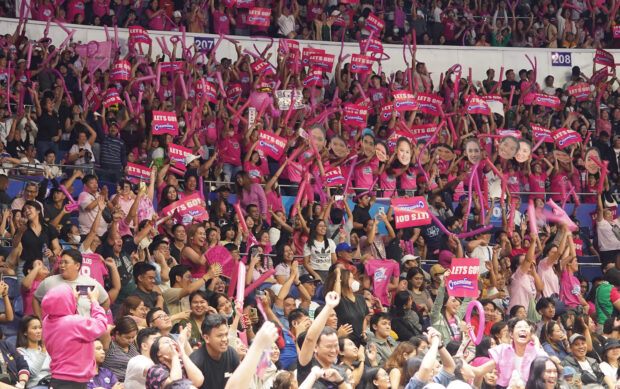PVL looks to address player tampering to preserve league harmony

A record volleyball crowd of close to 25,000 watched Game 2 of the Creamline-Choco Mucho title series, a testament to the PVL’s rabid following that came to being because of fair play among member teams. —AUGUST DELA CRUZ
The moment word leaked out on social media that a rising hitter was looking for a change of scenery, at least three teams began circling around the standout, with one allowing her a sniff of a contract offer. The hitter, a very reliable source told the Inquirer, is still under contract with her team.
Sitting at the helm of the country’s pioneering professional volleyball league, Ricky Palou understands that everything he will be doing is without precedent and that means applying institutional guardrails to problems that crop up.
Including tampering.
“That’s why we are looking at these problems and trying to remedy them with rules that will be lasting,” Palou, the Premier Volleyball League (PVL) president, told the Inquirer on Friday. A day after telling the Inquirer that sister teams will be barred from swapping players and that the upcoming rookie draft will prohibit squads from selling off coveted top picks, Palou is now setting his sights on tampering and team rights over players approaching the end of their contracts.
“We don’t have existing rules for some issues, that’s why we are looking at these cases to determine our next steps,” Palou added.
Rush of transfers
The rush of player transfers in the current PVL offseason, supercharged by the disbanding of talent-rich F2 that frees several big-named stars for hiring, has provided Palou with a Petri dish to examine what else needs to be done to fortify the pro league.
Tampering is a major issue. A player who gets a peek at a contract exceeding her current one in pay grade and other benefits could lead to discontent—and create a malignant atmosphere in an otherwise healthy locker room environment.
Professional basketball leagues like NBA have punitive actions in place to prevent tampering, the act of talking to players under contract with another team in an attempt to recruit them.
Palou also wants protection for teams even when players approach the end of their contracts, using guardrails such as the right of first refusal.
“We’re also looking at teams retaining their rights over players that they allow to play abroad,” he added.
These guidelines, along with instituting rules that will compel squads that draft college stars who forego their varsity eligibilities to be contractually obligated to allow those players to finish schooling.
“We also want to protect these players,” Palou said, adding that the league is already studying potential salary caps while drawing up guidelines against over-the-moon offers to free agents.
